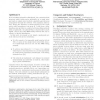Free Online Productivity Tools
i2Speak
i2Symbol
i2OCR
iTex2Img
iWeb2Print
iWeb2Shot
i2Type
iPdf2Split
iPdf2Merge
i2Bopomofo
i2Arabic
i2Style
i2Image
i2PDF
iLatex2Rtf
Sci2ools
116
click to vote
SPAA
2009
ACM
2009
ACM
A randomized, o(log w)-depth 2 smoothing network
A K-smoothing network is a distributed, low-contention data structure where tokens arrive arbitrarily on w input wires and reach w output wires via their completely asynchronous propagation through the network. The maximum discrepancy among the numbers of tokens arriving at the ouput wires, called smoothness, is at most K. It has been a longstanding open problem to construct a K-smoothing network with (i) optimal K, (ii) optimal Θ(lg w) depth (called smalldepth), (iii) no use of the AKS sorting network, and (iv) no reliance on global initialization. In this work, we present a very simple, randomized network which meets all four desiderata: • It is the cascade of a reasonably small number (about 150) of copies of the simple block network [6]; hence, it is small-depth and does not use the AKS sorting network. • It achieves smoothness K = 2; hence, it is optimal with respect to smoothness due to a recent improbability result about randomized, small-depth, 1-smoothing networks from [...
AKS Sorting Network | Computer Science | Randomized Counting Network | Simple Block Network | SPAA 2009 |
Related Content
| Added | 08 Mar 2010 |
| Updated | 08 Mar 2010 |
| Type | Conference |
| Year | 2009 |
| Where | SPAA |
| Authors | Marios Mavronicolas, Thomas Sauerwald |
Comments (0)

